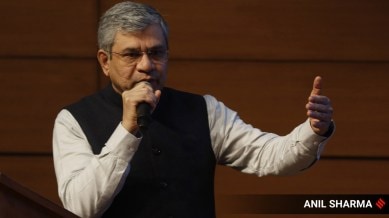Stay updated with the latest - Click here to follow us on Instagram
Media in digital transition, should discuss solutions for fair compensation: Ashwini Vaishnaw
Union Information and Broadcasting (I&B) Minister Ashwini Vaishnaw said that the government was “fully prepared” to provide any “necessary support” through this transformation.

URGING the industry and stakeholders to discuss the gamut of challenges associated with the transition of traditional media to new media, from employment to compensation, Union Information and Broadcasting (I&B) Minister Ashwini Vaishnaw said that the government was “fully prepared” to provide any “necessary support” through this transformation.
“Along with traditional media, which included newspapers and television as major mediums, digital media has emerged in a significant manner,” Vaishnaw said at the Digital News Publishers Association (DNPA) Conclave 2025. The DNPA is an industry association of 20 media companies in the country. The Indian Express is a member.
monthly limit of free stories.
with an Express account.
“This conclave should discuss the role of the traditional media and prepare clear policy recommendations on how the media industry adapts to the changes and moves forward while protecting employment, copyright issues, how traditional media can get a fair compensation, and how to give adequate importance to content that is produced after editorial checks,” Vaishnaw said. “The government is ready to offer help to the media during this transition. The whole country views the media with great responsibility.”
Vaishnaw’s comments assume significance as they come amid growing scepticism of news publishers in several jurisdictions, including in the United States and India, over concerns of copyrighted material, such as news reports, being used by companies like OpenAI for training their foundational models, without permission or payment.
This has led to court cases, including in India, where publishers – members of the DNPA, including The Indian Express, among others – have mounted a legal challenge against OpenAI over the “unlawful utilisation of copyrighted material”.
The discussion of compensating news publishers for the original work they produce, of course, goes much beyond the advent of AI platforms. The tussle initially began between publishers and social media companies like Facebook and YouTube. In several jurisdictions, that too, remains a contentious issue – as publishers have pressed for compensation, social media companies like Meta have threatened to shut down news on their platforms.
I&B Secretary Sanjay Jaju also flagged the need for publishers to receive fair compensation from tech companies, saying that its absence could undermine quality journalism in the country – a problem especially during a time of “unchecked spread of misinformation and click bait journalism, which is undermining our democratic values”.
“While digital platforms have been profiting significantly from the journalism of India as well, there is also a stark imbalance in revenue sharing. Indian media houses produce content that drives engagement, yet there is a feeling that they receive very little in return. I think without a fair compensation model, quality journalism definitely faces a huge risk and also has chances of getting compromised,” Jaju said.
He said safe harbour provisions of the Information Technology Act, which were designed to protect digital intermediaries like social media companies, have at times become an “excuse or evading responsibility”.
“The global discourse around safe harbor protections also signals the need for platforms to proactively curb misinformation rather than reacting after harm is done,” Jaju said.